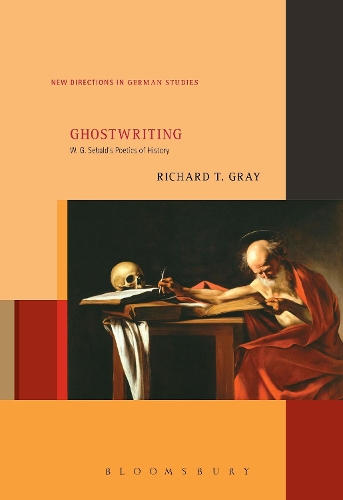
Ghostwriting: W. G. Sebalds Poetics of History
(Hardback)
Available Formats
Publishing Details
Ghostwriting: W. G. Sebalds Poetics of History
By (Author) Dr. Richard T. Gray
Bloomsbury Publishing PLC
Bloomsbury Academic USA
16th November 2017
United States
Classifications
Tertiary Education
Non Fiction
Literature: history and criticism
Literary studies: c 1900 to c 2000
Comparative literature
Literary theory
833.914
Physical Properties
Hardback
464
Width 140mm, Height 216mm
685g
Description
Ghostwriting provides the first comprehensive analysis of the fictional prose narratives of one of contemporary Germanys most recognized authors, the migr writer W. G. Sebald. Examining Sebalds well-known published texts in the context of largely unknown unpublished works, and informed by documents and information from Sebalds literary estate, this book offers a detailed portrait of his characteristic literary techniques and how they emerged and matured out of the practices and attitudes he represented in his profession as a literary scholar. The title Ghostwriting signals the convergence in Sebalds works of a set of diverse historical questions, philosophical views, and literary practices. Many historical ghosts haunt Sebalds narratives on the level of story. Moreover, Sebalds narrator plays the role of a ghostwriter in the profound sense that his stories fictionally re-enact the histories of obscure, but once-living individuals whose lives they revitalize, and whose fates are tied up with the most virulent historical conjunctures of the modern world. This study thus seeks to comprehend the constitutive elements of Sebalds poetics of history, his implementation of literary tools for effective historical memorializing.
Reviews
A truly magisterial scholarly work on a writer who continues to inspire a small industry of academic labor In his new 464-page book Gray has produced what may very well be the definitive text on Sebald for both languages and readerships. * Gegenwartsliteratur: Ein germanistisches Jahrbuch (A German Studies Yearbook) *
Richard T. Gray is a remarkable reader of W. G. Sebald. Meticulous in his attention to detail as well as learned in understanding of the broader contexts, he teaches us new ways to think about this enigmatic writer. * Carol Jacobs, Birgit Baldwin Professor of Comparative Literature and Professor of German, Yale University, USA *
Ghostwriting is well-written, informative, and wonderfully insightful. With a lucid and evocative style, Richard T. Gray presents exciting revelations about new archival materials: Sebalds marginalia from his library and his partially unpublished manuscript about pending ecological disaster in Corsica (and the world). This book poses the question that all Sebald readers have asked at some point: In what direction might Sebalds writing have gone if he had not died at age fifty-seven Gray investigates whether Sebald might have returned to the eco-psychological style of the Corsica piece, as a ghostwriter for nature. Especially welcome is the wide-ranging learnedness, which Gray wears lightly, that makes Ghostwriting not just about Sebald but about modern Western literature and thought. This is an excellent, strong, authoritative bookthe first to treat Sebald with the care that such a great writer deserves. * John Zilcosky, Professor of German and Comparative Literature, University of Toronto, Canada *
Author Bio
Richard T. Gray is the Byron W. and Alice L. Lockwood Professor in the Humanities and Professor of German and European Studies at the University of Washington, USA. He is the author of five books, including Money Matters: Economics and the German Cultural Imagination, 1770-1850 (2008), A Franz Kafka Encyclopedia (with Ruth V. Gross, Rolf Goebel, and Clayton Koelb; 2005), About Face: German Physiognomic Thought from Lavater to Auschwitz (2004), and Stations of the Divided Subject: Contestation and Ideological Legitimation in German Bourgeois Literature, 1770-1912 (1995). He is the editor and/or translator of 11 books, including Volumes 2 and 11 of The Complete Works of Friedrich Nietzsche in 20 Volumes and Approaches to Teaching Kafkas Short Fiction (1995). He is Editor-at-large of Journal of the Kafka Society of America and General Editor of book series Literary Conjugations.
